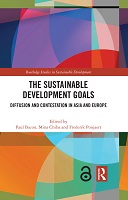Chapter 7 Diffusion of inclusive education in Malawi
| dc.contributor.author | Kawaguchi, Jun | |
| dc.contributor.author | Kuroda, Kazuo | |
| dc.date.accessioned | 2022-11-10T09:24:34Z | |
| dc.date.available | 2022-11-10T09:24:34Z | |
| dc.date.issued | 2023 | |
| dc.identifier.uri | https://library.oapen.org/handle/20.500.12657/59192 | |
| dc.description.abstract | This chapter discusses and analyzes the diffusion of the inclusive education concept as a norm of educational policy in developing countries by taking up primary school system in Malawi as a case. For the last two decades, international trends in education for pupils with disabilities have been shifting from “special” or “integrated” education to “inclusive education”. Inclusive education was originally launched through the Salamanca Statement, adopted at the World Conference on Special Needs Education in 1994. Adoption and widespread ratification of the 2006 Convention on the Rights of Persons with Disabilities provides the legal basis for this concept. Also, the SDGs, which embrace “inclusive” as a key term in the overarching Goal 4, significantly promote the diffusion of this concept in educational policies in both developed and developing countries. Our research is based on extensive fieldwork; seven classroom observations, 137 questionnaires and numerous interviews with key stakeholders including teachers, principals and parents. Based on this data analysis, the chapter discusses the complexity of diffusion of the norm of inclusive education from international to national, national to local, and suggests a more careful promotion of the new concept in educational practices, while fully acknowledging the achievement and potentials of inclusive education. | en_US |
| dc.language | English | en_US |
| dc.subject.classification | thema EDItEUR::K Economics, Finance, Business and Management::KJ Business and Management | en_US |
| dc.subject.classification | thema EDItEUR::J Society and Social Sciences::JN Education::JNF Educational strategies and policy | en_US |
| dc.subject.classification | thema EDItEUR::J Society and Social Sciences::JP Politics and government::JPQ Central / national / federal government::JPQB Central / national / federal government policies | en_US |
| dc.subject.classification | thema EDItEUR::R Earth Sciences, Geography, Environment, Planning::RP Regional and area planning | en_US |
| dc.subject.other | education for sustainability, global governance, norms, SDGs, wellbeing discourse | en_US |
| dc.title | Chapter 7 Diffusion of inclusive education in Malawi | en_US |
| dc.type | chapter | |
| oapen.identifier.doi | 10.4324/ 9781003205951-10 | en_US |
| oapen.relation.isPublishedBy | 7b3c7b10-5b1e-40b3-860e-c6dd5197f0bb | en_US |
| oapen.relation.isPartOfBook | e2b7c84e-c84c-45df-9f4d-27905e230550 | |
| oapen.relation.isFundedBy | 0c3f9ac7-e87b-4c15-bf78-80ac7812a0bc | en_US |
| oapen.relation.isbn | 9781032072180 | en_US |
| oapen.relation.isbn | 9781032072197 | en_US |
| oapen.imprint | Routledge | en_US |
| oapen.pages | 13 | en_US |
| peerreview.anonymity | Single-anonymised | |
| peerreview.id | bc80075c-96cc-4740-a9f3-a234bc2598f1 | |
| peerreview.open.review | No | |
| peerreview.publish.responsibility | Publisher | |
| peerreview.review.stage | Pre-publication | |
| peerreview.review.type | Proposal | |
| peerreview.reviewer.type | Internal editor | |
| peerreview.reviewer.type | External peer reviewer | |
| peerreview.title | Proposal review | |
| oapen.review.comments | Taylor & Francis open access titles are reviewed as a minimum at proposal stage by at least two external peer reviewers and an internal editor (additional reviews may be sought and additional content reviewed as required). |

